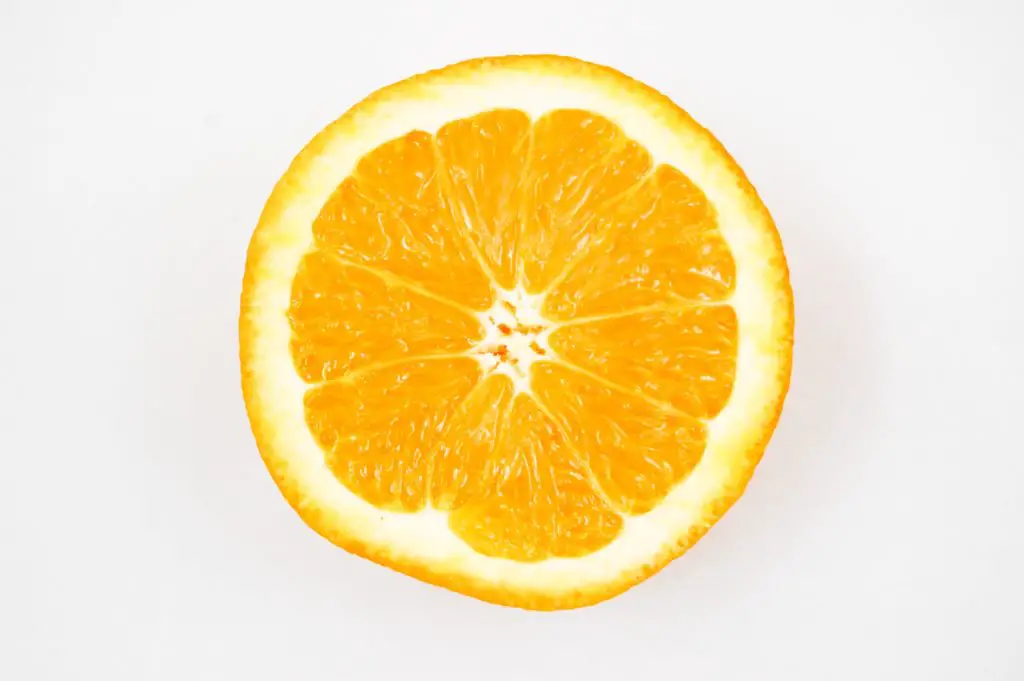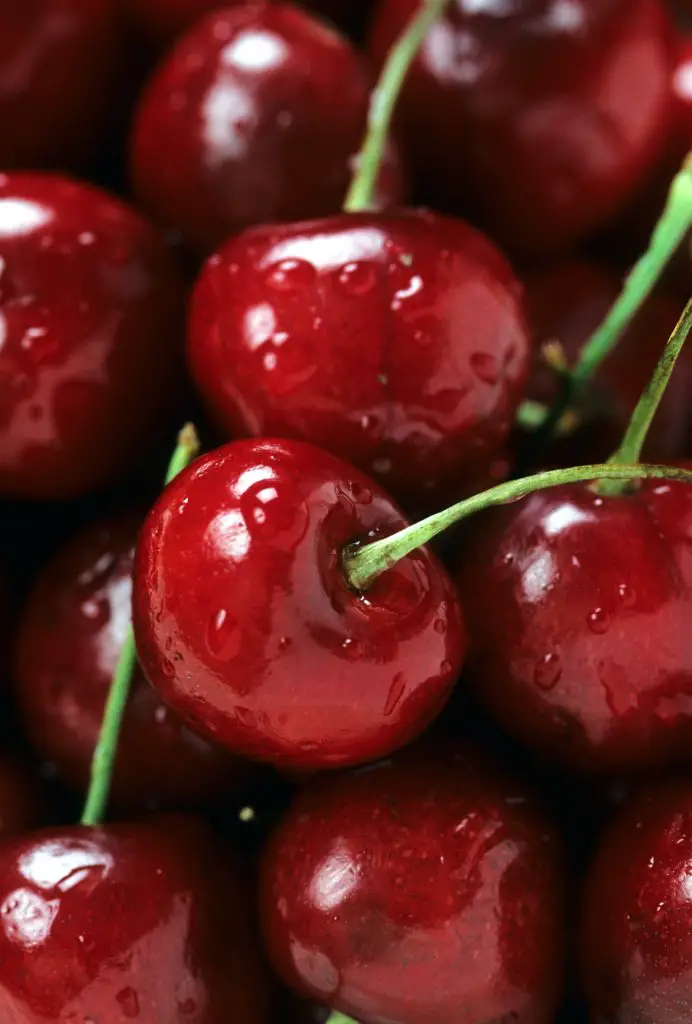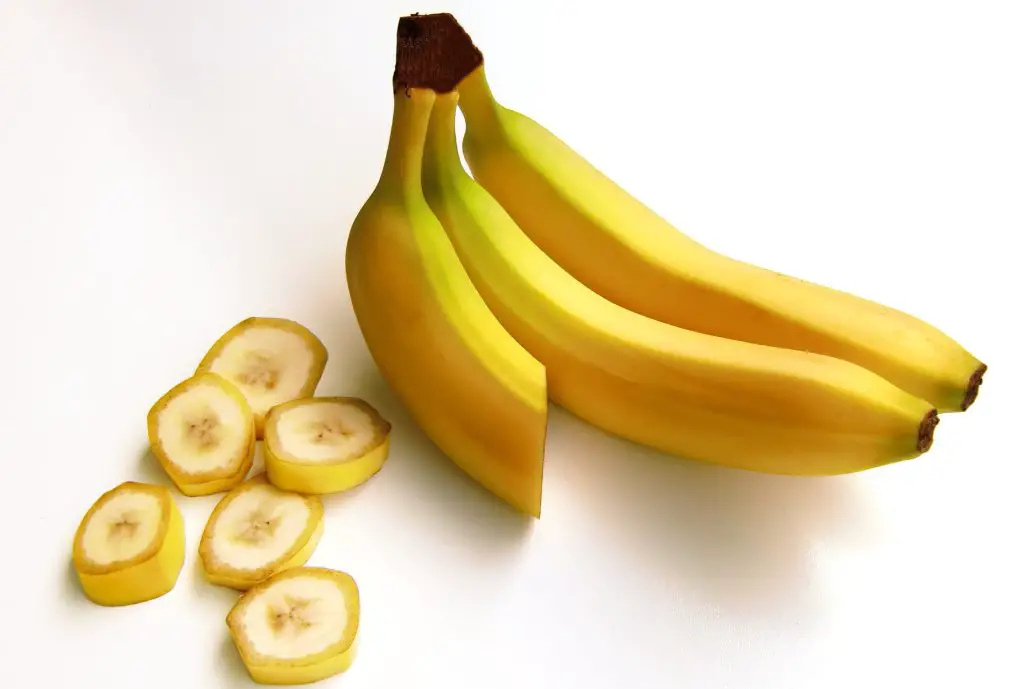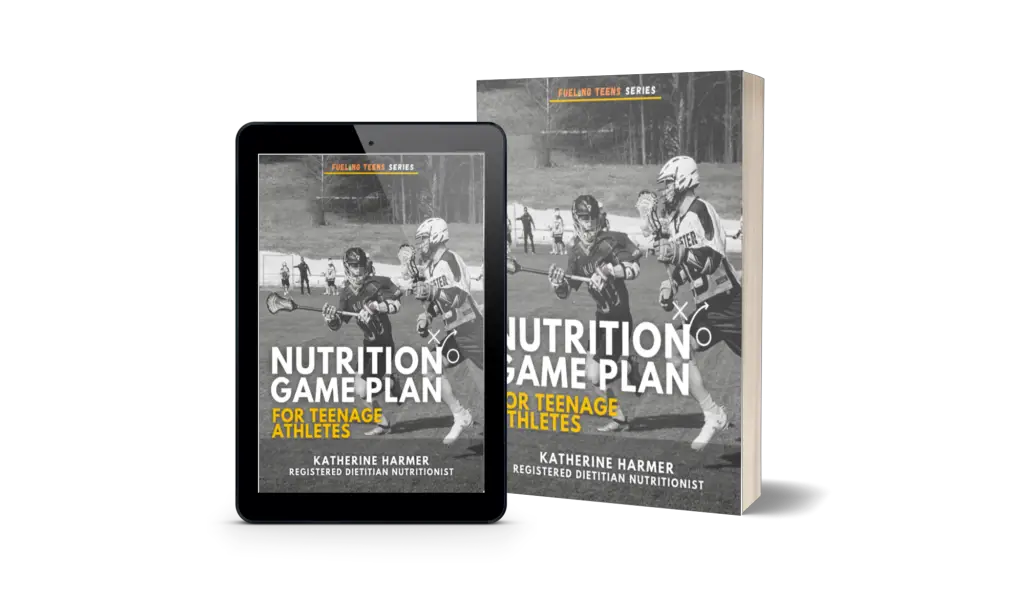Fruit is healthy and provides many important nutrients to fuel physical activity and provide major performance benefits. Teen athletes will benefit from adding nutrient-rich fruits to their diets.
Some of the best fruits for teenage athletes are berries, bananas, oranges, dates, cherries, watermelon, and dried fruits. I recommend eating 2-3 fruits every day for teens and choosing a mix of fresh, frozen, dried, and canned. Fruit can help boost recovery and improve performance for teen sports.
Keep reading below for the list of the best fruits for athletes and recommendations from a registered dietitian nutritionist for fruit intake before and after physical activity.

What Fruits Should Athletes Eat?
If you follow food trends, you know about the superfoods- foods that are packed with nutrients to bring you fantastic health benefits when included in your diet.
Fruit is nutrient-rich and delivers many important vitamins, minerals, antioxidants, phytochemicals, and more to help your body function.
Athletes, especially high school athletes, need to take advantage of healthy fruits to get important nutrients for major performance benefits. Proper nutrition is just as essential as regular training. Your diet should be just as much of a top priority as your fitness efforts.
This post will cover the best fruits for athletes, recommendations for fruit intake, fruits to avoid, and best fruits to eat pre-workout and post-workout. Keep reading to get the tips!
What Nutrients Does Fruit Provide Athletes?
As an athlete, you need the right nutrients for your body to function properly and fuel itself during high-intensity activity. Fruit can provide many of these important nutrients.
Fruit provides essential for sports nutrition:
Fiber– Fruit is a great way to get fiber. Fiber regulates gut health and the rate of digestion, meaning you’ll have a healthy gastrointestinal system because fiber will help you experience less constipation.
It will help you feel full after a meal and not crave unhealthy foods, and you’ll have a consistent energy supply with stable blood sugar. It will help you maintain a healthy weight and lower your overall risk of disease.
Fiber can slow down digestion, so it shouldn’t be consumed right before high-intensity training or game days. See my post on What Not to Eat Before a Football Game.
B Vitamins– Thiamin, Niacin, and vitamin B6 are important B vitamins that are involved in the metabolism of carbs, protein, and fat for energy production for your body.
They also play a role in nerve function, muscle contraction, and making new tissue. You can get many B vitamins from consuming fruits such as apples, bananas, citrus fruits, and berries.
Folate is another B vitamin that helps with DNA synthesis for healthy cell division and growth, including blood cell production.
Magnesium also helps with energy production, nerve function, and muscle contraction as well as the B vitamins, and it plays a role in bone mineralization, enzyme actions, and helping to build proteins. Magnesium is becoming a popular supplement but you can get it easily from a well-planned diet, which includes fruits like figs, bananas, and raspberries.
Iron is especially important for athletes. Important functions of iron include blood cell production, energy metabolism, and antioxidant function.
Iron helps your muscles work properly. With it, your body can turn carbohydrates into energy for you to use during exercise. And don’t forget, a main role of iron is to transport oxygen in the blood to all body tissues. Iron is essential for ensuring that you have the oxygen and fuel you need for your muscles to work best during exercise.
Vitamin C helps with wound healing, immune health, forming connective tissue, and as an antioxidant to stop cell damage. Another great benefit of Vitamin C is that it helps your body absorb more iron from plant-based foods.
You can get vitamin C from citrus fruits, berries, and kiwis. Plus, fun fact: the Brazilian fruit acerola is the size of a cherry and contains more vitamin C than an entire orange.
Potassium is important for athletes because it helps with muscle contraction. It is an electrolyte with sodium that balances your fluid levels. Low potassium can reduce an athlete’s energy and endurance levels. It’s also important for your heart and to decrease possible muscle cramps.

What Are the Best Fruits for Athletes?
Although all fruits are healthy and good for you- specific fruits provide amazing benefits to athletes. When you eat fruit, you are providing your body with micronutrients (vitamins, minerals), antioxidants, as well as energy (calories).
When athletes aren’t getting enough micronutrients it can lead to early fatigue, impaired immune function, muscle and cell damage, and overall poor performance. Vitamins and minerals help athletes prepare for peak performance with healthy bodies.
Another great benefit for athletes of consuming fruits is the high water content. Bring some fruits and vegetables to practice or your games to help with hydration and maintain your active lifestyle.
Here’s a list of some fruits that are rich in the important nutrients for athletic performance:
Berries-
Berries contain antioxidants and phytochemicals which protect against cell damage/oxidative stress during physical activity. This keeps your body working properly for healthy cells and muscles. Include a variety of berries of different colors for the most phytochemical benefits.

Tart Cherries–
Dark colored fruit like tart cherries are full of antioxidants and anthocyanins which reduce inflammation, prevent muscle damage and pain, and reduce soreness. Tart cherries are great to include for a recovery snack post-workout to help you heal. Tart cherries aren’t the easiest thing to eat, so try mixing them into smoothies or your electrolyte-rich drink.
Oranges-
Oranges provide potassium and vitamin C, carbohydrates, and water. They help to lower fatigue and dehydration after intense exercise, and support a healthy immune system. Oranges help athletes absorb more iron from plant foods. Other citrus fruits help as well, but oranges are the easiest to eat, so bring a bag of cut up orange slices to eat after your next training session.
Strawberries–
Another great way for athletes to get vitamin C is to eat strawberries. Vitamin C in strawberries will help you stay healthy by fighting infection, produce collagen for strong muscles and bones, and enhance iron absorption. Plus strawberries are a fiber-rich food to provide healthy blood sugar control and energy.
Bananas-
Bananas are a great fruit for athletes, they are easy to bring along and easy to eat. Bananas deliver easy-to-digest carbohydrates, which provide needed fuel before practice or games. They also provide potassium- an electrolyte that can be lost during vigorous exercise.
Do any of these fruits sound like something you’ll prepare for your next post-workout snack? Some of my other nutrient-rich favorites include peaches, plums, and even dried fruit.
How Much Fruit Should an Athlete Eat?
Now that you have an idea for great fruits you can eat to help you perform your best as an athlete, it’s important to know the recommendation for how much fruit you should be getting daily.
High school athletes should be getting a balance of nutrients from each of the main food groups. The goal for fruit is about 2-3 servings of fruit per day. It’s okay to consume more fruit, but make sure that you are getting enough of the other food groups to have a balanced diet.
What are the Healthiest Fruits?
Berries, citrus fruits, bananas, apples, avocados, and mangoes are some popular fruits that are nutrient-rich for great health benefits.
You don’t necessarily need to follow the “superfood” trends and buy blueberries, acai, and goji berries to get antioxidants. Eat the fruit you enjoy and fruit that is affordable and in season. The healthiest fruits are any fruit in whole form without added sugar.
All fruit is healthy in different ways, just make sure to include a variety of fruits so you are covering a variety of nutrients. Think of your favorite fruits and ways you can include them throughout the day between your practices and games.
Some of my favorite ways to consume fruit as an athlete is to drink smoothies in the morning for a quick breakfast, bring orange and apple slices with me during the day, and eat a banana with peanut butter for a post-workout snack.

What is the Most Unhealthy Fruit?
Throughout my practice these are my least favorite questions, “which fruits are least healthy?” or “which fruits are fattening?” or “which fruits are bad for you?”.
It’s fruit! Fruit is not bad for you. Bananas are not fattening. Do you think you need to stop eating fruit because it’s unhealthy? If you aren’t going to eat fruit, what are you going to eat in its place? Probably something a lot less healthy than fruit.
No fruit is unhealthy. Most of the “unhealthy” labels on fruits refers to blood sugar responses. Some fruits increase your blood sugar more than others. This shouldn’t be a problem for an athlete, unless you need to watch your blood sugar levels.
Individual insulin responses are more important. Be smart about your fruit intake, don’t over-do it and don’t eat the same fruit all the time. Eat bananas, eat grapes, eat a variety and enjoy them all in moderation. Fruit is packed with nutrients, water, fiber, and are lower in calories than many other foods. Fruit is good for you!
Plant-based diets (which include fruit) can be extremely beneficial by lowering risk of disease and helping you maintain a healthy weight. Include fruit in your diet– any and all types of fruit. Include fresh fruit, dried fruit, canned fruit, frozen fruit, and fruit juice.
The only unhealthy fruits are fruits that contain added sugar. Be careful of fruit that is canned in heavy syrup- look for fruit canned in juice. Also look out for fruit juice- only drink 100% fruit juice. You don’t need any extra sugar in your diet.
Fruit juice isn’t the best way to consume fruit. Drinking one glass of orange juice is almost like eating 3-4 or more oranges. You wouldn’t eat that many whole oranges at a time, and it’s not necessarily the best decision, plus you aren’t getting all the fiber from consuming the whole fruit. Stick with moderation with your juice intake, and a balance between your fruit intake throughout the day.
Need some more help with your sports nutrition this season? Get help from a registered dietitian nutritionist with my newest ebook: Nutrition Game Plan for Teen Athletes
Includes 28 day meal plan, snack list, supplement tips, protein tips, how to gain or lose weight the right way, meal schedule, and more. Click here for more information.
What is the Best Fruit to Eat Before a Workout?
Dried fruit can be helpful to eat before a workout. Many athletes rely on some quick-digesting carbohydrates just before training or games for a boost of energy.
Researchers have found that dried fruit such as raisins can be effective for performance benefits by providing your muscles with needed energy. Raisins are a good choice because they are less expensive, easy to grab, and provide significant amounts of other important nutrients for athletes, such as iron, fiber, and potassium.
Carbohydrates are the main source of fuel for active muscles, which the body stores as glycogen before physical activity. This is the preferred fuel source for muscles during exercise.
A pre-workout meal 2-4 hours before an event should include carbohydrates that are easy to digest including fruits like bananas, apples, or oranges. A small amount of fruit can be appropriate in the hour before physical activity to again refuel important carbohydrates for top performance during competition.
The best fruit to eat before a workout depends on which fruits are easy-to-digest and will not cause intestinal discomfort soon after during exercise. Oranges, apples, and bananas can be great choices.
See also: The 25 BEST Pre-Workout Meals and Snacks For a Teenage Athlete
What is the Best Fruit to Eat After a Workout?
Training time is so important to improve physically, but the time after the workout is crucial for improving and becoming stronger. Recovery techniques, including post-workout nutrition, can make a huge difference in your overall fitness capacities and performance.
See the list above of the best fruits for athletes- berries, cherries, oranges, strawberries, bananas, peaches, plums, and dried fruit. Any of those fruits are great options for an after-workout snack to help you replenish your lost carbohydrate stores.
After a workout, athletes should choose fruits that are higher in carbohydrates such as bananas and dried fruit. Some great post-workout fruits also include raisins, pears, grapes, blueberries, and watermelon for additional micronutrients and antioxidants to replenish your body’s stores after an intense workout. Fruits also have carbohydrates that will help your body replenish and store them for later.
Tart Cherries may help reduce inflammation and prevent muscle damage, pain, and soreness, while bananas provide potassium which is an electrolyte that can be lost during vigorous exercise.
Fruits can also be a refreshing way to help you replace fluids lost during exercise. Snack on watermelon or oranges for a great hydration snack post-workout.
See also: The BEST Post-Workout Snacks for Teenagers – Dietitian Recommended
Below are some additional common questions I wanted to address. I’ve received these questions regarding fruit intake and athletic performance.
Are Bananas Okay for High School Athletes to Eat?
Yes, bananas are a great choice of fruit for high school athlete. Don’t listen to all the negative media messages you’ve seen about bananas being “fattening” or “bad carbs”. Those people aren’t nutrition experts and don’t have a nutrition degree, they are just trying to sell you their fad diet.
Bananas are low in calories and a natural source of vitamins, minerals, and electrolytes which need to be replaced after exercise. You’re probably familiar with the fact that bananas are high in potassium.
Intense exercise and sweating causes potassium loss, so bananas as a post-workout snack help you replenish your body’s supply. The potassium in bananas will help protect you from muscle cramps and fatigue after a training session. They will also re-supply carbohydrates which is the fuel source for your muscles.
Bananas are seen as “bad carbs” because they are high on the glycemic index scale, meaning they increase your blood sugar more than other fruits (glycemic index is not perfect and differs from each individual, it doesn’t take into account someone’s insulin response).
If you are watching your blood glucose levels, then it is important to pay attention to the glycemic index of food. Otherwise, enjoy an appropriate amount of fruit in moderate portions. Athletes need carbohydrates and fruit is a great way to get them.
Are Grapes Good After a Workout?
A beneficial post-workout snack includes carbohydrates, fluid, and protein, so grapes make a great post-workout snack. They contain carbohydrates, electrolytes, and water for hydration. Some professional athletes swear by grapes for a refreshing snack post-training session.
Now that you have the carbohydrates taken care of- don’t forget the protein (grapes won’t provide what you need).
Why Do Athletes Eat Fruits and Vegetables?
Athletes eat fruits and vegetables to optimize athletic performance by providing their bodies with appropriate nutrition to get the correct amount of needed nutrients for top health.
Fruits and vegetables are some of the best ways to get essential micronutrients that help our bodies function and work properly.
Is it Okay to Eat Dry Fruit After a Workout?
After a workout is the time to think about enhancing the benefits you received from your workout. As you exercise, your body uses the glucose in blood and then turns to stored amounts in your liver and muscle tissue called glycogen to continue to fuel your workout. After exercise you need a snack or meal to replace glycogen back into your muscles. Look for foods that have carbohydrates.
Dried fruit is a great way to replenish muscle glycogen post-workout. You could eat a regular meal and be set, but when you need something quick, dried fruit can be a simple snack. Dried fruit can be expensive and fresh fruit might be a better option after your workout, depending on your plan.
Dried fruit has the same nutrients as fresh fruit, but without all the water. Fruit is filling because of it’s water content- dehydrated fruit shrinks and doesn’t contain this high amount of water, making it smaller and less filling.
You’ll probably feel like you need to eat more dried fruit to feel full. Fresh fruit is probably best, but don’t feel like you have to avoid dried fruit. Choose dried fruit that has no added sugar, and eat an appropriate amount (a small handful) and you can be satisfied and refueled.
Summary
- Fruit is a healthy choice for athletes because it provides important vitamins, minerals, antioxidants, and phytochemicals to help your body function.
- Fiber, B vitamins, folate, magnesium, iron, vitamin C, and potassium are some of the important nutrients athletes need and can get from eating fruit.
- Berries, tart cherries, oranges, strawberries, bananas, peaches, plums, and dried fruit can be excellent choices for athletes. Athletes should include a variety of fruit for top health benefits.
- Athletes should eat about 2-3 servings of fruit per day.
- The healthiest fruits are any fruit in whole form without added sugar. No fruit is unhealthy, but some cause your blood sugar to spike more than others.
- Choose easy-to-digest fruits before a workout such as oranges, apples, and bananas.
- After a workout choose fruits that are higher in carbohydrates such as bananas and dried fruit, and fruits that have a high water content for hydration.
- Take advantage of healthy fruits to get important nutrients for performance benefits. Proper nutrition is just as essential as regular training. Your diet should be just as much of a priority as your fitness efforts.
What are your favorite fruits to bring for a workout snack? Let me know what fruits work best for you.
See Also:
- What are the Best and Worst Foods for a Teenager to Eat?
- How Many Grams of Fat Does a 15-Year Old Need Per Day?
- What is the Best Diet Plan for a 15 Year-Old? Tips from a Dietitian
Eat. Fight. Win!
Written by Katherine Harmer, RDN
Fueling Teens is a participant in the Amazon Services LLC Associates Program, an affiliate advertising program designed to provide a means for sites to earn advertising fees by advertising and linking to Amazon.com. We also participate in other affiliate programs which compensate us for referring traffic.


